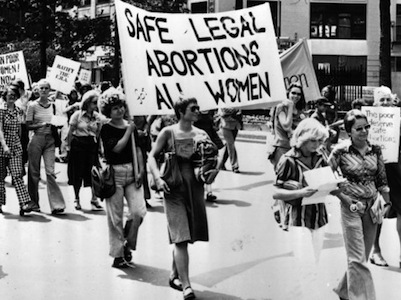We all know someone who’s had an abortion. It’s time to stop ignoring the facts, says Emily Heist Moss.
Today is the 40th anniversary of Roe vs. Wade, the 1973 Supreme Court decision that protected the right of women to terminate a pregnancy. Lest we forget what we’re talking about—and who we’re talking about—a few facts that often get forgotten when we discuss access to abortion:
- 60% of women who got abortions in the United States in 2008 were already mothers.* Since the economy crashed, that number has increased to almost 72%.**
- 28% of women who get abortions identify as Catholic. Twenty five percent attend religious services at least once a month.* Thirteen percent identify as evangelical or “born-again” Christians.***
- 40% of women who get abortions have family incomes below the poverty line (about $18K for a family of three.)*
- 90% of abortions in the United States occur during the first 12 weeks of pregnancy.*
- Less than 8% of abortions are obtained by minors.**
- About half of all U.S. pregnancies are unintended, and about half of those end in abortion.***
- 57% of women obtaining abortions have some college education.***
- If current rates continue, estimates suggest about 35% of women of current reproductive age will have an abortion before they turn 45.***
Those numbers tell a pretty compelling story. First, no matter who you are or where you live, you know a woman who has had an abortion. Maybe you have had an abortion yourself, or perhaps your mother, your sister, your friend has been down this particular road. Most certainly a coworker has, or a classmate. What they want us to believe, that only irresponsible women have abortions, that only selfish women have abortions, that only promiscuous women have abortions, that’s all bullshit. Educated women have abortions, rich women have abortions, older women have abortions, “family women” of “good” character, from “good” families, have abortions.
I said these numbers are often “forgotten,” but that’s not the case. These numbers are intentionally avoided, ignored, swept under the rug, shelved in favor of potent rhetoric and emotional outcry. It is easier to have a conversation about “morals” and “responsibility” if we pretend that the users of abortion services are women without a sense of either. It is easier to rail against them if they are somehow miraculously distinct from the women we know and love. But that is simply, factually, scientifically not true. They come from all backgrounds, all ages, all faiths. There is no us and them, no division between “those” kind of women and “our” kind of women. There are just women.
Why do abortions happen? Because sex education in this country is sparse and inconsistent. Because some people believe their personal religious agenda is more important than the health and well-being of all of us. Because sometimes antibiotics don’t get along with the Pill, because sometimes condoms break, because we can know all the facts and still be swept away by hormones and desire. Abortions happen because expressing sexuality is part of being human and birth control is not infallible.
The story of American abortion politics cannot just be told with numbers. This is a picture we have to paint by putting faces to statistics, by filling in the stark numbers with family history and tough choices and the color of personal experience. I have never had an abortion. Fingers crossed, knocking on wood, smiled upon by the latex Gods and Nuva Ring goddesses, I never will. But I know women who have had abortions (remember, we all do), and my family, like most families, has been shaped over the last century by the family planning options that were and weren’t available.
In the 1920s, my great-grandmother, recently widowed, committed suicide when she found out she was pregnant with her sixth child. In the ’60s, another family member gave a child up for adoption after dropping out of school to carry her pregnancy to term. I can’t say exactly how their lives would have been different with better birth control (or any birth control), or with access to abortion services, but I can say that they didn’t have the choices that I do. That’s what this is about: options. Options for you, options for the family you already have, options for the family you might have one day.
*****
A few weeks ago on the red line in Chicago I overheard a black teenager talking to someone on the phone about abortion politics. “No,” he explained, “Obama’s not pro-abortion, he’s pro-choice. It’s about the right to choose, not promoting abortions!” I couldn’t help but smile. The whole train car was listening; he continued more emphatically “Dude…no…I know what you think, but it’s about the fact that your values aren’t everyone’s values…Yeah, you think that, but not everyone thinks that…No, dude…it’s about choice! It’s about options!” He was about 16.
So happy anniversary, Roe! Raise a glass tonight not to abortion, but to 40 more years of fewer abortions. To economic policies that enable people to care for their families, to education that is comprehensive and informed by science, to preventative healthcare and affordable medicine, to options, to choices, to autonomy over our own bodies and our decisions.
***National Abortion Foundation
Emily Heist Moss is a New Englander in love with Chicago, where she works in a tech start-up. She blogs every day about gender, media, politics and sex at Rosie Says, and has been published at Jezebel, The Frisky, The Huffington Post and The Good Men Project. Find her on Facebook and Twitter.
Related Links:
- Nobody’s Perfect, So Stop Trying To Be
- Why I Regret Dating Older Men
- You Are Pretty Enough To Find Love

